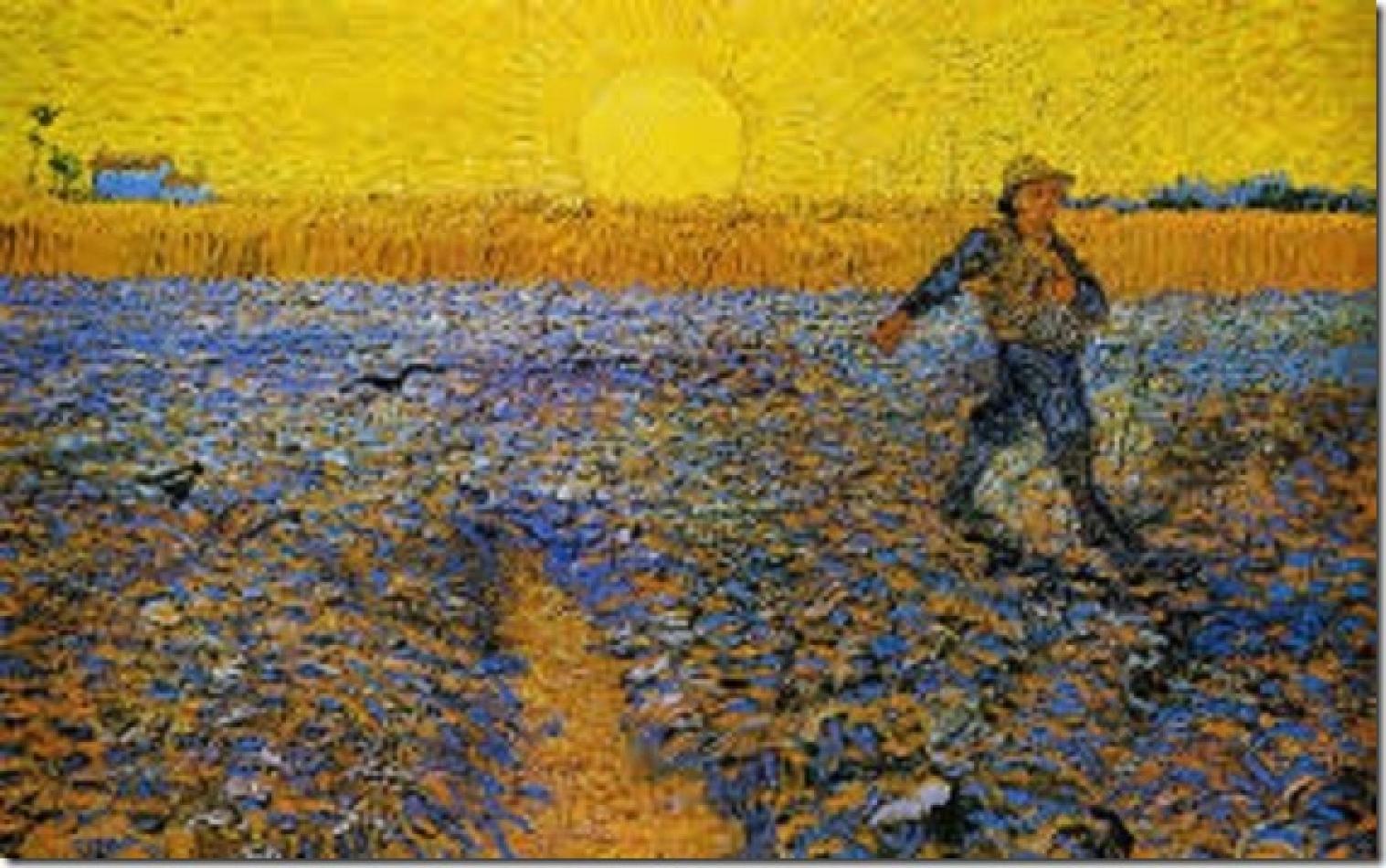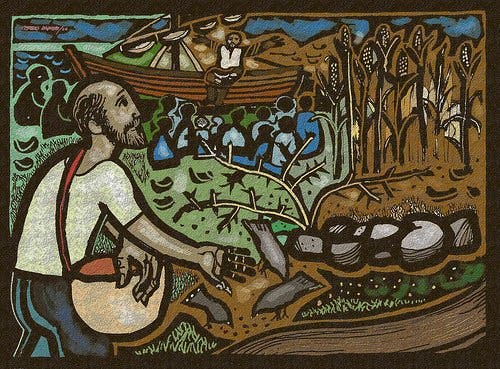Daniel Comboni
Comboni Missionaries
Institutional area
Other links
Newsletter
Theologians and preachers wisely expose the very deep truth but sometimes they use a language that is complicated, confusing, and difficult to follow. They give the impression of not caring whether people understand, are interested, enthusiastic or simply bored. Jesus had a different pedagogical approach: even when he faced tough issues, he always used a simple language. [Picture of Vincent Van Gogh (1888)].
Matthew 13:1-23
GOSPEL REFLECTION
Theologians and preachers wisely expose the very deep truth but sometimes they use a language that is complicated, confusing, and difficult to follow. They give the impression of not caring whether people understand, are interested, enthusiastic or simply bored. Jesus had a different pedagogical approach: even when he faced tough issues, he always used a simple language. He resorted to comparisons and images. He told stories set in the life of shepherds, fishermen, traders, tax gatherers, and most importantly, farmers among whom he was born and grew up. The parable —said the rabbis— is like the wick of a candle: it costs a few cents, and yet, even if its light is dim, it can make one find a treasure.
Today, Jesus introduces a very difficult theological theme. It is a puzzle to which the acutest minds and noblest spirits of humankind have tried in vain to give an answer: “Why evil?” “Why does the Kingdom of God encounter many difficulties to succeed?” He faces it with his usual method: the parable.
The passage is clearly divided into three parts. The first (vv. 1-9) consists of the parable. The second (vv. 10-17) contains some not easy to interpret sayings of Jesus. In fact, they seem to imply that he does not want his listeners to be converted. The third (vv. 18-23) is an application of the parable to the life of the community. Before commenting on each of the three parts, we make a premise. Biblical scholars agree in recognizing that the explanation of the parable, although placed on the lips of Jesus and perfectly reflects his thought, has not been directly announced by him. By whom then?
The early Christians, in giving catechesis to their communities, were not anxious to transmit literally what Jesus had said. They tried, rather, to make his message understandable and effective, applying it to concrete situations in their lives. They were convinced that the evangelists did not have to act as simple repeaters to be faithful to the Word of the Master. They must make his message updated. The one who, in fact, repeats exactly the words of a person does not always authentically refer to his thought.
The early Christians sometimes have changed a bit, one or the other parable, or have added an explanation to fit the situation of their communities. This is the case of the parable proposed to us today. Jesus told it to teach his listeners. The early Christians have reinterpreted and applied it to the concrete problems in their lives, problems that were not exactly the same as those of the disciples who heard Jesus. The updated catechesis is thus born as found in vv. 18-23.
We begin by clarifying the meaning and the message the parable had in the mouth of Jesus. Then, after having interpreted the difficult central verses, we will explain its reading done by the community of Matthew.
A strange way to sow (vv. 1-9)
In the parable, there is a detail that immediately draws attention: the waste of seeds scattered in large quantities in a barren land. The farmer’s behavior is surprising. He seems to act unwisely. Exactly three-quarters of the story is dedicated to the grain that ended up on the road, in stony places or among thorns and devoured by birds, burned or stifled.
The insistence on the waste, failure, and disappointing prospects is an important element. It reflects the reality of the world in which evil appears much stronger, more efficient than good. Note also its progressive, relentless dominance: the seed does not sprout, that which sprouts does not grow, that which grows is suffocated.
On whom does it depend? Why does this happen? If God is good, why does his Kingdom not grow unchallenged? These are the questions that Jesus wanted to give an answer.
To understand the parable, it should be noted that at that time the sowing was done before and not after the field had been prepared. The farmer sowed before plowing, hoeing, eradicating the brambles and removing the stones. It is then understood why part of the seed could fall between the stones in the midst of weeds, among the thorns or above those little paths that are formed in the fields when they are crossed during harvest or during the period in which the fields are fallow.
Whoever observes the farmer in the parable is inclined to think that he is working in vain and wasting seed and energy. It is hard to believe that, in a field reduced to that state, something can sprout. Instead, after sowing, he plows: the paths disappear, thorns and grass are removed, the stones moved and the field that seemed unproductive, after a short time, is covered first by corn stalks, then by blonde ears. A true miracle!
Jesus tells this parable in a difficult moment of his life. In Nazareth, he is cast out, in Capernaum, he is taken as mad, the Pharisees want to kill him, and the disciples abandon him. It just seems that all his preaching has fallen in vain. The conditions are too unfavorable; his word seems destined to die (cf. Mt 11–12).
With this parable, he wanted to send a message to his discouraged disciples who asked him about the usefulness of the apostolic work he was doing. Despite all the contradictions and obstacles, his word would have given abundant fruit because it has in itself an irresistible force of life.
Contrary to all expectations, the coming of the Messiah was not sensational. It did not have great resonance. His passage through this world seemed to be among the most insignificant. It has not changed anything in the people’s social and political life. The Baptist was more famous than him. Jesus disappeared into the ground like a small, weak, almost invisible seed. However, after a short time, this seed has begun to sprout. The Gospel has raised humanity and we, today, can verify that the message of the parable of the sower is taking place.
All of us sometimes wondered if it’s worth proclaiming the Word of God in a corrupt world and society as those in which we live; if it still makes sense to speak of the evangelical beatitudes and teach catechism to people who do not listen, whose hearts are hardened, who think only about money, entertainment, and to what is transitory, fleeting, ephemeral. Are not the evangelizers, catechists, perhaps sowing in vain?
When these thoughts arise, it is time to profess the faith in the divine power contained in the Word of the Gospel.
Why does Jesus speak in parables? (vv. 10-17)
In the middle of his public life, Jesus takes stock and finds that very few people have accepted his message. Is there something to wonder about this fact? No, he replies. Even the Old Testament prophets were not being listened to. At the time of Isaiah, for example, people covered their ears in order not to hear the Word of God. They hardened their hearts so as not to convert (vv. 14-15).
Here is the reason why he resorts to parables: He makes a new attempt to break the deadlock. He thinks that, with this simple and concrete language, it will be easier to make inroads into the hearts of his listeners. The parable forces one to reflect, to look for the hidden meaning, to think, to fall into oneself and then to get converted.
These verses are an invitation to open, as soon as possible, the eyes, ears, and heart otherwise the parables remain as enigmatic stories and do not produce any fruit.
The four types of soil (vv. 18-23).
The application of the resemblance to the life of the community aims to help the disciples to identify the difficulties that the Word of God encounters in everyone. The scarcity of results depends neither on the seed nor the sower, but on the type of soil.
There is, first of all, a hardened heart, made as such—as it happens with the soil of a road—by many people who have walked on it. It represents the impenetrable heart to the Word of Christ because it has assimilated the way of thinking of this world, adapted to current morality and adopted the values proposed by the people. This is the evil one, the devastating demon that sneaks into thoughts and feelings, filling them with meanness, frivolity, proposals of meaningless life, and senseless reasoning.
Then there is a variable heart that gets easily excited but after a few days, it goes back to what it was before. It’s like a rock covered with a thin layer of the earth: if one plants a seed, it sprouts, but immediately dries up.
There is also a restless heart that is stirred by the problems of this world. It chases success and wealth and nourishes mean dreams. These concerns are like thorns; they choke the seed of the Word.
Finally, there is a good heart in which the Gospel produces abundant fruit.
It is not about the four categories of persons, but four interior dispositions that are found in different proportions, in every person. It is useless that the evangelist, to launch the precious seed of the Word, waits to find the ideal terrain, that which is perfectly fertile. Good soil, thorns, rocks and arid soil will always be together. For some, this will be a source of discouragement, but for the true apostles, authentic catechists, it will become a stimulus to a more abundant sowing. Many efforts will be in vain, but one day, punctually, the ear will make its appearance in every person.
READ: The division between the followers of Jesus and the religious leaders has deepened. Now Jesus will begin to teach in parables, encouraging his followers to think about the meaning of the parables, and their application.
REFLECT: Jesus’ parables make reference to ordinary life yet are sufficiently complex to tease the mind into active thought. Think about the way in which the parable of the sower can apply to anyone’s life today.
PRAY: External events and circumstances can hinder a person from receiving and living according to the Word of God. Daily prayer to avoid such circumstances and events can be helpful. “Do not let us get in over our heads and save us from all evil.”
ACT: Listen carefully to the Word of God in church and try to find ways of making the Word of the Lord your own.
Fernando Armellini
Italian missionary and biblical scholar
https://sundaycommentaries.wordpress.com





